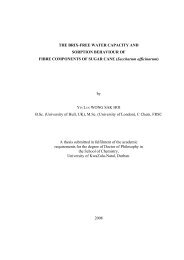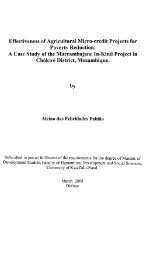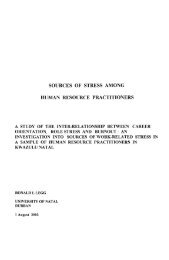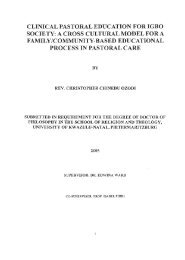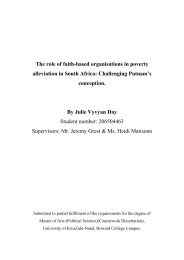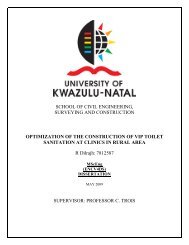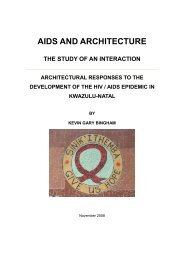View/Open - ResearchSpace - University of KwaZulu-Natal
View/Open - ResearchSpace - University of KwaZulu-Natal
View/Open - ResearchSpace - University of KwaZulu-Natal
Create successful ePaper yourself
Turn your PDF publications into a flip-book with our unique Google optimized e-Paper software.
“You bring your own 2 litres <strong>of</strong> water … so that you don’t use up the water that the patients<br />
or family members have saved for themselves. When you go to a house you have to work in<br />
such a way that you improve the situation, not worsen it. So you don’t get there and start<br />
criticizing them if they don’t have enough water, but you show them that you have brought<br />
your own and they should try to save more next time.”<br />
(Focus group 8, organisation H)<br />
“When we get to our patients and find that they have no water… you have to go and fetch the<br />
water from somewhere so that you can bath the patient. In some areas the truck comes to<br />
supply water so we go there”. (Focus group 3 organisation C)<br />
4.6.9 Ridicule from the community members, insecurity and demoralisation faced by the<br />
Volunteer Caregivers.<br />
In spite <strong>of</strong> the fact that volunteer caregivers are not paid, there has been a lot <strong>of</strong> mockery and<br />
contempt from the members <strong>of</strong> the community. They are generally perceived as people <strong>of</strong><br />
low status in their communities because <strong>of</strong> doing risky jobs without any pay. This causes<br />
frustration and demoralisation amongst volunteer caregivers which could cause them to quit<br />
their job:<br />
“…We are looked down upon as people who have no intelligence, as people who do not<br />
think. They “say you are doing this job and you don’t get paid. Who can go to work for such<br />
a risky job and not get paid? We only get stress and death?”<br />
(Focus group 3, organisation C)<br />
Most volunteer caregivers lost most <strong>of</strong> their fellow workers who got infected as a result <strong>of</strong> the<br />
risky volunteer care giving work. They feared contagion and death due to insufficient<br />
protection from infections caused by short supply <strong>of</strong> materials. More importantly, volunteer<br />
caregivers felt demoralised to perform what they called ‘risky job’ without being paid:<br />
“But the problem is that there is no love <strong>of</strong> doing this work because there is no money it<br />
would be better if we at least get something. These days it is difficult to volunteer because we<br />
were not this number, many <strong>of</strong> our fellow caregivers have died after doing this work; they got<br />
infected, so we are not happy to keep on volunteering without getting something. The only<br />
thing we get is death”. (Focus group 2, organisation B)<br />
Some volunteer caregivers were also concerned about their safety while performing their<br />
duties in the communities because they had to walk long distances to reach their patients’<br />
homes. A participant in one focus group discussion narrated a story where they came across<br />
patients who belonged to dangerous gangs that smoked dagga in the communities that they<br />
served. These experiences could cause volunteer caregivers to neglect such homes as such the<br />
58




